MENU
(Nov. 4, 2016 - by Harold Goerzen) Fed by mountain glaciers and jungle rains, Peru’s remote Ucayali River (along with neighboring rivers) is considered the main headwater of the mighty Amazon. It’s also strategic for thousands of river dwellers, providing fish, food and jobs while giving access to vast forests and serving as a lifeline to the outside woprld—a 910-mile “highway” navigated by vessels of all sizes.
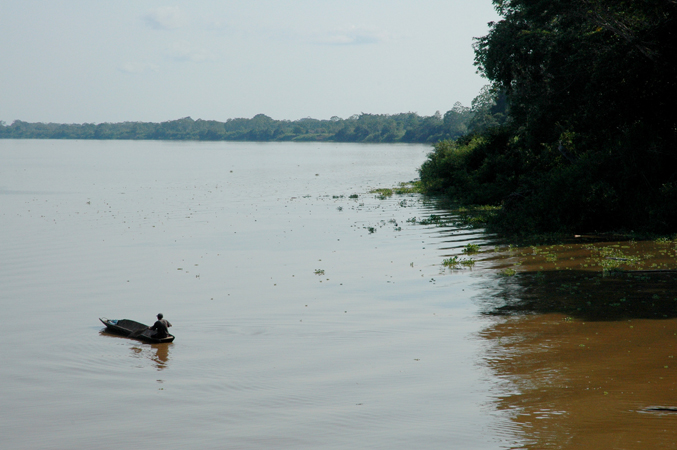 “It’s truly a river of life,” said Bible teacher Eliezer González. “It’s the main communication channel for indigenous and mestizo communities along the river. It’s a way of trade with those communities. At all times, you’ll see large and small boats ply the river, loaded with people and bananas and all kinds of merchandise, going back and forth to distant and nearby communities.”
“It’s truly a river of life,” said Bible teacher Eliezer González. “It’s the main communication channel for indigenous and mestizo communities along the river. It’s a way of trade with those communities. At all times, you’ll see large and small boats ply the river, loaded with people and bananas and all kinds of merchandise, going back and forth to distant and nearby communities.”
The body of water also served as a spiritual lifeline for river dwellers in five Shipibo villages during the 10th annual Misión a Bordo (Mission Aboard) outreach the last five days of September.
González was one of four teachers, 33 participants, a six-member medical team and 12 riverboat supporting staff who were on board the riverboat El Evangelista (The Evangelist), giving medical care to local residents, teaching the Bible and studying principles of missions led by seasoned Latin American teachers.
“These communities are neglected by the government and by the inhabitants of large cities, but not by God,” he declared.
Seeing Record Numbers of Patients
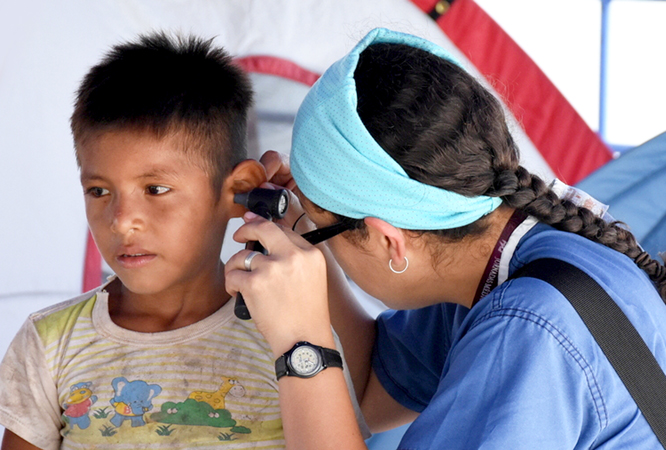 The majority of this year’s participants came from Peru—nearly half for their second time. Volunteers included six medical doctors—three from Peru, two from Reach Beyond’s Hospital Vozandes in Quito, Ecuador, and Dr. Mark Nelson, a former Reach Beyond missionary working as a physician in Fort Worth, Texas, who headed the medical team again this year.
The majority of this year’s participants came from Peru—nearly half for their second time. Volunteers included six medical doctors—three from Peru, two from Reach Beyond’s Hospital Vozandes in Quito, Ecuador, and Dr. Mark Nelson, a former Reach Beyond missionary working as a physician in Fort Worth, Texas, who headed the medical team again this year.
The medical team saw 750 patients this year—double the average of 375 patients in previous outreaches.
“Patients included children, youth, adults and the elderly,” explained Reach Beyond missionary Américo Saavedra who has repeatedly helped organize and lead the event along with Peruvian missionary Juan Carlos Sánchez and local facilitators. “Medical help is always part of the Mission Aboard project and is welcomed by every village we visit.”
Saavedra, who heads Reach Beyond’s Apoyo pastoral training and leadership development ministry in Quito, grew up in Pucallpa, the city from where the ship departed on Monday, Sept. 26. With a population of over 200,000, it’s the largest city along the Ucayali River.
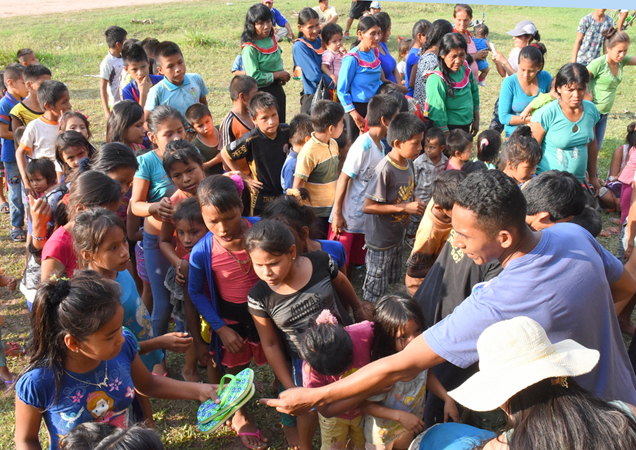 Team members visited five rural communities—Vista Alegre, Samaria, Dinamarca, Antigua Ahuaypa and San Luis—all for the first time. “In each village there is a specific protocol,” Saavedra explained. “First the apu (head of the community) approaches the boat with his entourage, and from the banks of the river gives us words of welcome and tells us, ‘We’ve been waiting, and community doors are open for you.’”
Team members visited five rural communities—Vista Alegre, Samaria, Dinamarca, Antigua Ahuaypa and San Luis—all for the first time. “In each village there is a specific protocol,” Saavedra explained. “First the apu (head of the community) approaches the boat with his entourage, and from the banks of the river gives us words of welcome and tells us, ‘We’ve been waiting, and community doors are open for you.’”
While physicians attended to patients, participants distributed clothing and sandals to local residents, assisted with crowd control, took part in the evening services in each village, played with the children, shared Bible stories and carried equipment and supplies to and from the boat each day.
“They also surveyed each community that we visited to have a better understanding of the people, their worldviews, needs, fears, and hopes for the future,” Saavedra noted.
He pointed out that Misión a Bordo attendees “could not stop talking about how engaging and fun it was to connect with the community—especially with the children. Our doctors worked extra hours to serve those in need—even saving a lady from severe dehydration. The village chief thanked them profusely and made the invitation to return any time.”
Overcoming Challenges
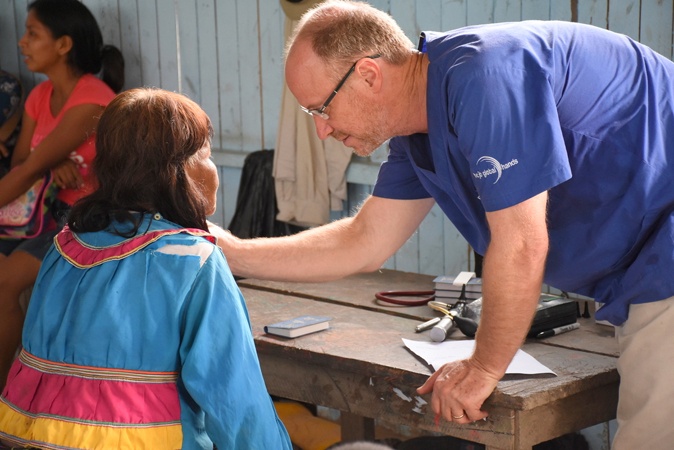 A problem emerged on the second day when Nelson realized that he had miscalculated the amount of medicine the team would need to treat parasites—a widespread problem in the rain forest related to unsafe drinking water.
A problem emerged on the second day when Nelson realized that he had miscalculated the amount of medicine the team would need to treat parasites—a widespread problem in the rain forest related to unsafe drinking water.
“Our Shipibo guide and translator, Abelardo Vásquez, was willing to travel back to Pucallpa (a six-hour trip) to purchase the needed medicine and rush back immediately to the boat—an all-night and half-a-day journey,” Saavedra recounted. “This shows the level of commitment of our Mission Aboard volunteers.”
Nelson pointed out it was a good thing the guide purchased even more medicine than he’d ordered as patient counts continued to rise. “Had he brought the ‘correct’ amount of worm medicine … we would have run out by midweek (when we were too far from Pucallpa), and we would have been without our most essential medicine the last two days of clinics,” he explained. “I should mention that Abelardo arrived at the pharmacy in Pucallpa just minutes before it closed!”
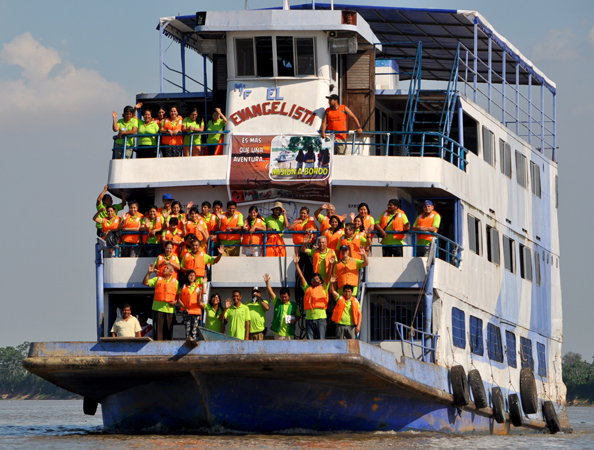 “Our theme for this year was, ‘More than an Adventure—It’s Mission Aboard,’” Saavedra added. “The adventure part included relating to a new culture, new language, new places, new situations, new music, new worldviews, and … 98-plus-degree temperatures.”
“Our theme for this year was, ‘More than an Adventure—It’s Mission Aboard,’” Saavedra added. “The adventure part included relating to a new culture, new language, new places, new situations, new music, new worldviews, and … 98-plus-degree temperatures.”
When asked why the event was more than an adventure, one girl replied, “It’s like seeing something larger than yourself. That ‘something’ was seeing God at work in the villages we served.”
Teaching on Missions
The daily teaching sessions were well received as “participants engaged in deep discussions with teachers and facilitators,” Saavedra said.
“The response to the teaching and hands-on experience on missions this year revealed to us that young people in Latin America are becoming increasingly curious and want to be involved in missions,” he continued. “Why? Without a doubt, the moving of the Holy Spirit. Young people have been challenged to think beyond themselves, and this outreach makes it happen.”
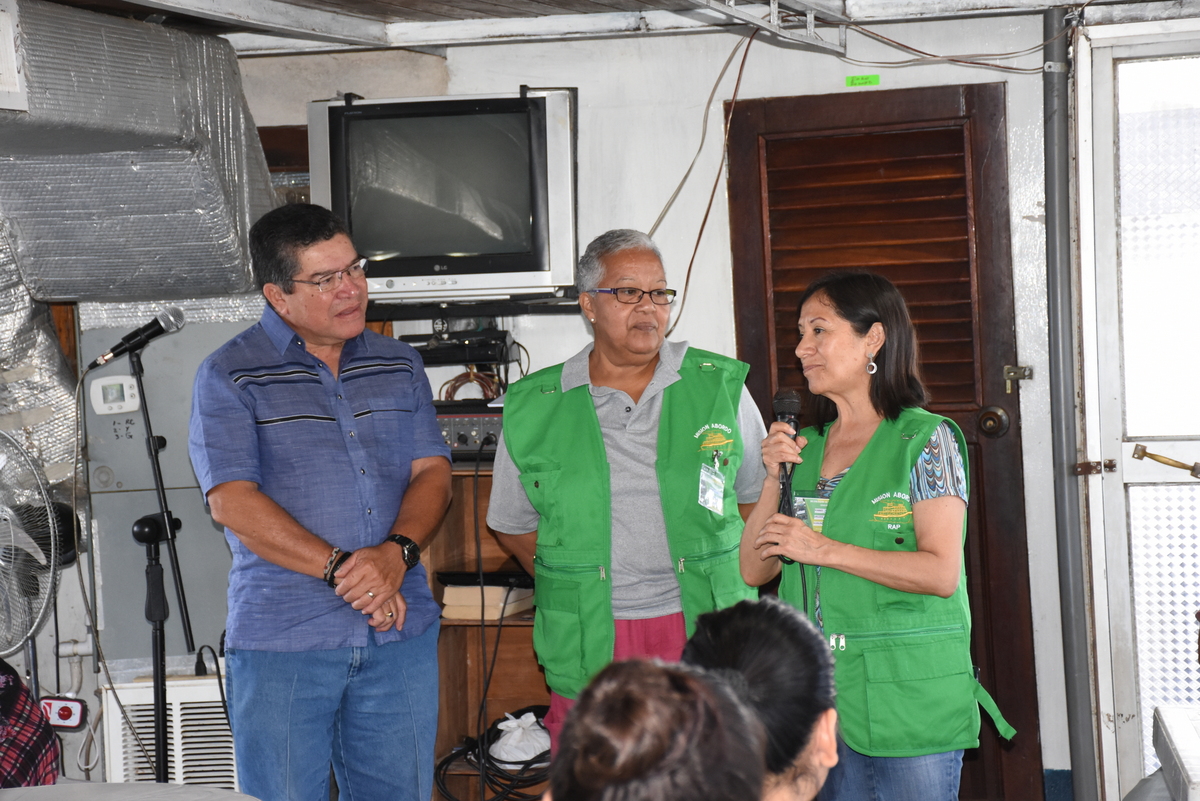 Among the teachers was Rosa Rosado from Puerto Rico “who spoke with much grace, about the involvement of the local church in sending missionaries,” González explained. “With simplicity and great charisma, her teaching encouraged everyone.”
Among the teachers was Rosa Rosado from Puerto Rico “who spoke with much grace, about the involvement of the local church in sending missionaries,” González explained. “With simplicity and great charisma, her teaching encouraged everyone.”
Peruvian Irma Espinoza taught about techniques on investigating and learning about indigenous communities in Latin America. “She knows this theme thoroughly, having lived for years in these communities,” González related. “She is also a consultant for nine nations in matters relating to ethnic groups and their care.”
An Ongoing Impact
One of last year’s volunteers, Roberto Carlos Rivas Lopez, revealed he was so moved by his first experience with Mission Aboard that he volunteered to serve again this year. “He was there and his contribution shone in every respect,” Saavedra mentioned. “Now he wants to join our logistics team year after year.”
Another participant* is studying nursing in Peru and has a heart for Muslims in the Middle East. She has since contacted the staff at Corrientes (Currents), Reach Beyond’s missionary mentoring program for Latin Americans in Quito, with hopes of joining the program.
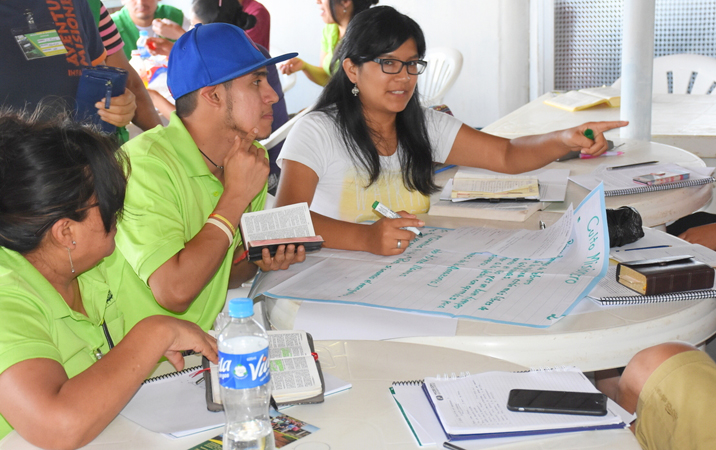 Nelson said he was encouraged by the testimonies and enthusiasm of the young people, many of whom told about their desire to serve the Lord. “On the last night there was a large group of participants on the roof of the boat, sharing spontaneously what God had done in their lives during this week.”
Nelson said he was encouraged by the testimonies and enthusiasm of the young people, many of whom told about their desire to serve the Lord. “On the last night there was a large group of participants on the roof of the boat, sharing spontaneously what God had done in their lives during this week.”
“Local churches have been revitalized by engaging its members in specific community outreaches,” Saavedra added. “When asked when and why they began this type of community involvement, Mission Aboard is often included as being a catalyst.”
Next year’s outreach, which is already in the planning stages, could include a “more serious research component,” Saavedra stated. “We recently connected with a young Peruvian who had also joined Mission Aboard a few years ago. He’s doing graduate work in anthropology in Ecuador and showed an interest in doing some missiological research using the outreach as a platform for his graduate work.”
“Conversations are underway to see if this could be a good fit for him and for us,” Saavedra concluded. “The potential for Mission Aboard to serve missions on a larger scale is worth the thought.”
*Name omitted for security reasons
Sources: Reach Beyond, worldatlas.com, britannica.com
 “It’s truly a river of life,” said Bible teacher Eliezer González. “It’s the main communication channel for indigenous and mestizo communities along the river. It’s a way of trade with those communities. At all times, you’ll see large and small boats ply the river, loaded with people and bananas and all kinds of merchandise, going back and forth to distant and nearby communities.”
“It’s truly a river of life,” said Bible teacher Eliezer González. “It’s the main communication channel for indigenous and mestizo communities along the river. It’s a way of trade with those communities. At all times, you’ll see large and small boats ply the river, loaded with people and bananas and all kinds of merchandise, going back and forth to distant and nearby communities.”The body of water also served as a spiritual lifeline for river dwellers in five Shipibo villages during the 10th annual Misión a Bordo (Mission Aboard) outreach the last five days of September.
González was one of four teachers, 33 participants, a six-member medical team and 12 riverboat supporting staff who were on board the riverboat El Evangelista (The Evangelist), giving medical care to local residents, teaching the Bible and studying principles of missions led by seasoned Latin American teachers.
“These communities are neglected by the government and by the inhabitants of large cities, but not by God,” he declared.
Seeing Record Numbers of Patients
 The majority of this year’s participants came from Peru—nearly half for their second time. Volunteers included six medical doctors—three from Peru, two from Reach Beyond’s Hospital Vozandes in Quito, Ecuador, and Dr. Mark Nelson, a former Reach Beyond missionary working as a physician in Fort Worth, Texas, who headed the medical team again this year.
The majority of this year’s participants came from Peru—nearly half for their second time. Volunteers included six medical doctors—three from Peru, two from Reach Beyond’s Hospital Vozandes in Quito, Ecuador, and Dr. Mark Nelson, a former Reach Beyond missionary working as a physician in Fort Worth, Texas, who headed the medical team again this year.The medical team saw 750 patients this year—double the average of 375 patients in previous outreaches.
“Patients included children, youth, adults and the elderly,” explained Reach Beyond missionary Américo Saavedra who has repeatedly helped organize and lead the event along with Peruvian missionary Juan Carlos Sánchez and local facilitators. “Medical help is always part of the Mission Aboard project and is welcomed by every village we visit.”
Saavedra, who heads Reach Beyond’s Apoyo pastoral training and leadership development ministry in Quito, grew up in Pucallpa, the city from where the ship departed on Monday, Sept. 26. With a population of over 200,000, it’s the largest city along the Ucayali River.
 Team members visited five rural communities—Vista Alegre, Samaria, Dinamarca, Antigua Ahuaypa and San Luis—all for the first time. “In each village there is a specific protocol,” Saavedra explained. “First the apu (head of the community) approaches the boat with his entourage, and from the banks of the river gives us words of welcome and tells us, ‘We’ve been waiting, and community doors are open for you.’”
Team members visited five rural communities—Vista Alegre, Samaria, Dinamarca, Antigua Ahuaypa and San Luis—all for the first time. “In each village there is a specific protocol,” Saavedra explained. “First the apu (head of the community) approaches the boat with his entourage, and from the banks of the river gives us words of welcome and tells us, ‘We’ve been waiting, and community doors are open for you.’”While physicians attended to patients, participants distributed clothing and sandals to local residents, assisted with crowd control, took part in the evening services in each village, played with the children, shared Bible stories and carried equipment and supplies to and from the boat each day.
“They also surveyed each community that we visited to have a better understanding of the people, their worldviews, needs, fears, and hopes for the future,” Saavedra noted.
He pointed out that Misión a Bordo attendees “could not stop talking about how engaging and fun it was to connect with the community—especially with the children. Our doctors worked extra hours to serve those in need—even saving a lady from severe dehydration. The village chief thanked them profusely and made the invitation to return any time.”
Overcoming Challenges
 A problem emerged on the second day when Nelson realized that he had miscalculated the amount of medicine the team would need to treat parasites—a widespread problem in the rain forest related to unsafe drinking water.
A problem emerged on the second day when Nelson realized that he had miscalculated the amount of medicine the team would need to treat parasites—a widespread problem in the rain forest related to unsafe drinking water.“Our Shipibo guide and translator, Abelardo Vásquez, was willing to travel back to Pucallpa (a six-hour trip) to purchase the needed medicine and rush back immediately to the boat—an all-night and half-a-day journey,” Saavedra recounted. “This shows the level of commitment of our Mission Aboard volunteers.”
Nelson pointed out it was a good thing the guide purchased even more medicine than he’d ordered as patient counts continued to rise. “Had he brought the ‘correct’ amount of worm medicine … we would have run out by midweek (when we were too far from Pucallpa), and we would have been without our most essential medicine the last two days of clinics,” he explained. “I should mention that Abelardo arrived at the pharmacy in Pucallpa just minutes before it closed!”
 “Our theme for this year was, ‘More than an Adventure—It’s Mission Aboard,’” Saavedra added. “The adventure part included relating to a new culture, new language, new places, new situations, new music, new worldviews, and … 98-plus-degree temperatures.”
“Our theme for this year was, ‘More than an Adventure—It’s Mission Aboard,’” Saavedra added. “The adventure part included relating to a new culture, new language, new places, new situations, new music, new worldviews, and … 98-plus-degree temperatures.”When asked why the event was more than an adventure, one girl replied, “It’s like seeing something larger than yourself. That ‘something’ was seeing God at work in the villages we served.”
Teaching on Missions
The daily teaching sessions were well received as “participants engaged in deep discussions with teachers and facilitators,” Saavedra said.
“The response to the teaching and hands-on experience on missions this year revealed to us that young people in Latin America are becoming increasingly curious and want to be involved in missions,” he continued. “Why? Without a doubt, the moving of the Holy Spirit. Young people have been challenged to think beyond themselves, and this outreach makes it happen.”
 Among the teachers was Rosa Rosado from Puerto Rico “who spoke with much grace, about the involvement of the local church in sending missionaries,” González explained. “With simplicity and great charisma, her teaching encouraged everyone.”
Among the teachers was Rosa Rosado from Puerto Rico “who spoke with much grace, about the involvement of the local church in sending missionaries,” González explained. “With simplicity and great charisma, her teaching encouraged everyone.”Peruvian Irma Espinoza taught about techniques on investigating and learning about indigenous communities in Latin America. “She knows this theme thoroughly, having lived for years in these communities,” González related. “She is also a consultant for nine nations in matters relating to ethnic groups and their care.”
An Ongoing Impact
One of last year’s volunteers, Roberto Carlos Rivas Lopez, revealed he was so moved by his first experience with Mission Aboard that he volunteered to serve again this year. “He was there and his contribution shone in every respect,” Saavedra mentioned. “Now he wants to join our logistics team year after year.”
Another participant* is studying nursing in Peru and has a heart for Muslims in the Middle East. She has since contacted the staff at Corrientes (Currents), Reach Beyond’s missionary mentoring program for Latin Americans in Quito, with hopes of joining the program.
 Nelson said he was encouraged by the testimonies and enthusiasm of the young people, many of whom told about their desire to serve the Lord. “On the last night there was a large group of participants on the roof of the boat, sharing spontaneously what God had done in their lives during this week.”
Nelson said he was encouraged by the testimonies and enthusiasm of the young people, many of whom told about their desire to serve the Lord. “On the last night there was a large group of participants on the roof of the boat, sharing spontaneously what God had done in their lives during this week.”“Local churches have been revitalized by engaging its members in specific community outreaches,” Saavedra added. “When asked when and why they began this type of community involvement, Mission Aboard is often included as being a catalyst.”
Next year’s outreach, which is already in the planning stages, could include a “more serious research component,” Saavedra stated. “We recently connected with a young Peruvian who had also joined Mission Aboard a few years ago. He’s doing graduate work in anthropology in Ecuador and showed an interest in doing some missiological research using the outreach as a platform for his graduate work.”
“Conversations are underway to see if this could be a good fit for him and for us,” Saavedra concluded. “The potential for Mission Aboard to serve missions on a larger scale is worth the thought.”
*Name omitted for security reasons
Sources: Reach Beyond, worldatlas.com, britannica.com
